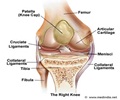People over the age of 55 in the United States often complain about hip or knee pain. Simple lifestyle habits can reduce the strain placed on the joints.

‘In the United States, nearly 30 million people are treated for joint pain in their knees and hips each year. Engaging in high impact activities like running, Zumba and intake of omega 3 rich foods can help improve hip and joint health.’





Individuals have some ability to reduce the strain put on their knees and hips. The relationship between being overweight and joint pain is a contentious one. If joint pain is rooted in being overweight, it is important to healthily lose weight. Developing a stronger core can also lessen the strain placed on joints. People who engage in "high impact" activities, like running, basketball or Zumba, can take steps to prevent joint issues like torn ligaments and inflammation. Physical therapy, to strengthen the muscles surrounding the hips and knees, can do wonders in reducing and preventing joint pain.Supplements can aid in improving joint health and reducing pain. Omega 3s block inflammatory cytokines and prostaglandins, reducing joint tenderness and stiffness. Also, ginger has been shown to be a natural anti-inflammatory while Capsaicin reduces substance P, a pain transmitter.
Treatment Options
Too often, joint pain is considered part of aging, and if a person has suffered over a long period of time, it can be considered part of life. Persistent joint pain, which lasts more than six months and is not responding to activity modification and/or anti-inflammatory medicines, means it''s time to see an orthopedist.
Common treatments for knee and hip joint pain are arthroscopy and joint replacement. Arthroscopy can be done for patients with mild arthritis to remove a torn meniscus in the knee or a labrum in the hip. Recovery from this procedure is typically four to eight weeks. Hip or knee replacements are done for more advanced arthritis. Recovery for hip replacement is typically four to eight weeks, but is largely dependent on the patient''s health. Partial knee replacement recovery lasts approximately four to six weeks; a total knee replacement has a recovery time of six to 12 weeks. Reducing the chances of needing orthopedic surgery is possible, but knowing the signs of pain that may require medical intervention is vital.
Advertisement















